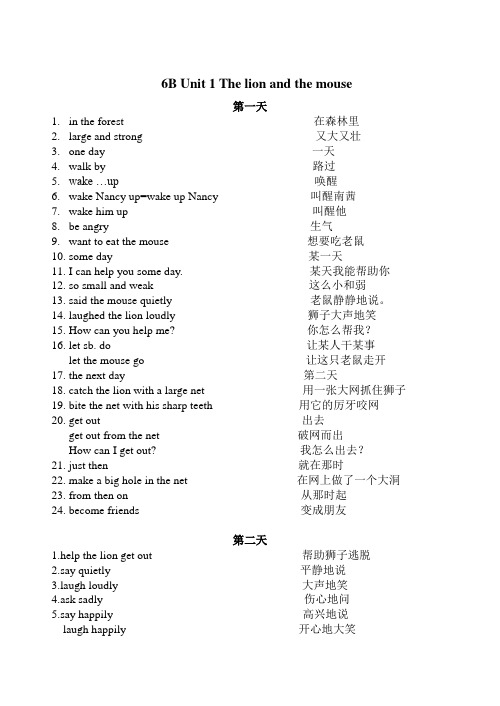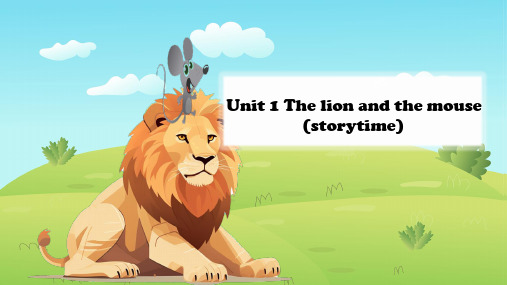6B Unit 1 The lion and the mouse(2)
Unit 1 The lion and the mouse (教案)-六年级英语下册(译林版三起)

Picture 1:There was a lion in the forest. He was very large and strong.
4.的道理,感受朋友间相互帮助的美好情感。
教学
重难点
1.能正确地听、说、读词汇:mouse, walk by, wake up, some day, let...go, the next day, net, bite, sharp, sadly, just then, soon, from then on
本节课的"Story time”故事情节,是一篇非常有趣的关于狮子和老鼠的故事。六年级的学生也掌握了部分学习故事的方法。所以在故事教学中,教师可以把学习的主动权交给学生,教师在课堂上更多的是扮演引导者和监督者的角色。在教学中,建议教师落地新课标的要求,设计合适的教学活动,来发展学生的核心素养。通过层次鲜明,形式多样的听、说、读、写、看等活动激发高年级学生的学习兴趣,培养和提升其思维品质。同时通过个体回答,同伴学习和小组合作等多样化的互动形式来营造乐学、善学的课堂氛围。
Picture 2:One day, a mousewalked byandwokethe lionup. The lion was angry and wanted to eat the mouse.
T: How did the lion feel? What about the mouse?
S: The mouse isafraid.
Q: Why did the lion let the mouse go?
新译林 6B Unit 1 The lion and the mouse知识点梳理

6B Unit 1 The lion and the mouse第一天1.in the forest 在森林里rge and strong 又大又壮3.one day 一天4.walk by 路过5.wake …up 唤醒6.wake Nancy up=wake up Nancy 叫醒南茜7.wake him up 叫醒他8.be angry 生气9.want to eat the mouse 想要吃老鼠10.some day 某一天11.I can help you some day. 某天我能帮助你12.so small and weak 这么小和弱13.said the mouse quietly 老鼠静静地说。
ughed the lion loudly 狮子大声地笑15.How can you help me? 你怎么帮我?16.let sb. do 让某人干某事let the mouse go 让这只老鼠走开17.the next day 第二天18.catch the lion with a large net 用一张大网抓住狮子19.bite the net with his sharp teeth 用它的厉牙咬网20.get out 出去get out from the net 破网而出How can I get out? 我怎么出去?21.just then 就在那时22.make a big hole in the net 在网上做了一个大洞23.from then on 从那时起24.become friends 变成朋友第二天1.help the lion get out 帮助狮子逃脱2.say quietly 平静地说ugh loudly 大声地笑4.ask sadly 伤心地问5.say happily 高兴地说laugh happily 开心地大笑a happy boy 一个快乐地男孩6.Here comes the lion. 狮子来了。
Unit 1 The lion and the mouse(单元解读)六年级英语下册(译林版三起)

六年级下册Unit 1 The lion and the mouse单元解读一、单元内容体现的新课标理念本单元在英语核心素养的育人价值下进行,围绕单元主题“人与社会”展开教学。
本单元学习的主题主要是学习关于一些童话故事以及副词的使用等。
二、单元信息单元分为Story time、Grammar time、Fun time、Sound time、Song time、Cartoon time、Checkout time、Ticking time八部分组成。
主要学习“狮子和老鼠”的故事以及如何使用副词。
在教学上,对本单元内容进行整合以及重组,分为四个课时进行教授。
1.Story time,这一部分是一篇文章,主要是狮子和老鼠的童话故事,在授课时,当做一篇阅读课进行授课。
本篇通话主要讲述了狮子刚开始蔑视老鼠,狮子的强壮与老鼠的弱小相对比,但是老鼠却说自己能够帮助狮子,让狮子不太相信,但还是善良的放走了老鼠。
有一天狮子被猎人抓到了,弱小的老鼠真的救了狮子。
从一开始的不相信到后来的帮助,两者之间的对话语气发生了明显的变化,由此也引出来副词的用法。
另外本篇使用一般过去时叙述,也涉及了一些动词的过去式形式。
2.Grammar time&Fun time, 这两个部分作为一课时按照语法课进行教授,主要学习副词的用法,以及形容词如何变副词。
另外还涉及了一些动词的过去式形式。
Fun time主要是让学生们演绎狮子和老鼠的故事,让学生们进行表演的时候,一定要主语语气。
3.Culture&Cartoon time,这两个部分作为一课时按照对话课进行教授。
Culture time主要是区分文化的不同,在国外伊索寓言讲了许多的小故事,在中国,成语故事里面也有很多有趣的故事。
Cartoon time是一篇对话,主要讲述了Sam和Bobby打乒乓球的故事。
Sam 和Bobby在打乒乓球,由于Sam击球时太用力,把球大掉进了洞里。
Unit 1 The lion and the mouse六年级英语下学期(译林版三起)

in a large net
What happened?
Read and fill 仔细阅读课文第三部分,填写事情发生的经过。
The next day, two men_c_a_u__g_h__t the lion_w__i_t_h___ _a_______ _l_a_r_g_e___ _n__e_t____. The lion_b_i_t_____ the net with his _s_h_a_r__p__ _t_e_e_t_h___,but that _d_i_d_____ _n_o__t____ _h_e_l_p____.“How can I get out?” asked the lion_s_a__d_l_y__.
Let’s think
Discuss(讨论) tቤተ መጻሕፍቲ ባይዱis in groups.
Why can’t he make a hole by himself?
Read and imitate
Try to complete
There was a _________ in the_________.He was very_________ and _________.One day,a mouse_________ _________ and _________ the lion _________.The lion was_________ and wanted to _________ the mouse.”Please don’t_________me.I can help you_________ _________,”said the mouse_________.”You’re so small and _________!How can you help me?”laughed the lion_________.Then,he_________ the mouse_________. The_________ _________,two men _________ the lion with a large_________.The lion_________ the net with his _________ _________,but that _________ _________ _________.Then, the mouse came and helped the lion out.At last,they became_________.
Unit 1 The lion and the mouse(教案)-六年级英语下册(译林版三起)

2.在学习句型的过程中,引导学生了解中西文化的差别。
Part 4:
Checkout time。通过听力练习巩固Why -because句型。
SrepⅣ: Checkout time
1 Look and write
a. Talk about the picture
Look at the pictures and complete the sentences.Try to use “adverbs” tocomplete the sentences.
for you.Please use past tense to tell your story.
1.在音频中操练巩固Why- Because的句型,并能把课本中的练习完成。
Part 4:
Summary& Homework。总结本节课学习内容。并且布置今天的作业。
Step V:Summary
T:Do you find the rule about thequestion sentences.
T: If the questions begin with where, who, what, how, etc, we call them "Wh-questions". We usually use a falling intonation.
5. Practice a dialogue with different intonation.
P1:The boy is running_______.
P2:The girl is shouting _______.
P3:The children are talking _____________.
六年级下册英语课件-Unit 1 The lion and the mouse

Do you want these balls?
每当你完成一个Task, 都可以向罐子里注 入一些水。
Task1: Revision
I你ca还n知rea道d哪an些d u疑nd问e词rstF开ani头dllt的hie句nst子otrhy是eo降f Cb调alra呢tono?nktsime.
向Re…ad…a内nd注u入nd,er灌lin注e t…Ohe…naneswderas y(先, 自a己_读_wC_ea_rato_ko_n tmimeo, 然us后e画w出o答k案e) the _s_tr_o_n_g_ lion up. The lion
Homework
1. Read Cartoon time for 5 times. Try to imitate the recording. 2. Tell one animal story to your friends and parents.
I know there are many animal stories in Aesop’s Fables and Chinese idiom books.
Fill in the blanks 2、Read together.
The next day, the lion was _c_a_u_g_h_t_ by men. The mouse made a
Task6: Read and find
A good book is a good friend.
We know:
1. I can read and understand the cartoon. 2. The falling intonation(降调) of Wh-questions. 3. There are many animal stories in Aesop’s Fables and Chinese idiom books.
译林 英语 六年级下册 Unit 1 The lionand the mouse
asked laughed said
sadly loudly quietly happily
Let’s read.
excited quiet loud
excitedly quietly loudly
sad happy
sadly happily
形容词作表语或作定语修饰名词; 副词做状语修饰动词。
Choose and read.
2. want to do sth. 想做某事 如:I want to drink tea.
Story time
“Please don’t eat me. I can help you some day,” said the
mouse quietly. “You’re so
small and weak! How can you
狮子伤心地问。
2.The mouse said __________.
老鼠平静地说。 3. He laughs __________.
quietly
他修饰动词,
且置于动词之后。
Play the game.
large from then on quietly
快速读出出现的单词,看到炸弹要说“bomb嘭”。
Unit 1 The lionand the mouse(1)
Free talk
1. What animals do you like? 2. What do you think of the lion? 3. What do you think of the mouse(老鼠)? 4. Do you think the lion and the mouse
strong 强大的,强壮的
6B Unit1 The lion and the mouse知识点梳理(新译林英语)
6B Unit1 The lion and the mouse知识点梳理(新译林英语)六下6B Unit 1 The lin and the use 知识点梳理一、Phrases1 in the frest 在森林里2 al b 走过;路过3 ae up 醒,醒4 ae sb up 把某人叫醒be angr ith sb 对某人生气6 the next da 第二天7 be angr at sth 对某事生气8 ant t d sth 想要做某事9 ant sb t d sth 要某人做某事10 se da 某一天11 sa quietl 小声地说12 sit quietl 静静地坐着13 laugh ludl 大声地笑14 let sb d sth 让某人做某事1 ath the lin ith large net 用一口大网捉住狮子16 bite the net ith sharp teeth 用锋利的牙齿咬网17 as sadl 难过地问,伤心地问18 ust then 就在那时19 sa happil 开心地说,20 fr then n 从那时起21 bee friends 成为朋友22 sa exitedl 兴奋地说,激动地说23 ae a stud plan 制定学习计划24 It desn’t atter 没关系。
2 the b ver there 那边的那个男孩26 pla table tennis happil 开心地打乒乓球27 heer fr sb ludl 大声地为某人欢呼28 be exited at / abut… 对……很兴奋// 激动29 in the grund 在地下30 reah the apple 够得着那个苹果31 reah the par 到达公园32 have an idea 有一个主意33 bring se ater quil 很快拿水34 pur…int… 把……倒入……3 ell dne 干得很好。
(完整ppt)译林版牛津英语6B Unit1(1) the lion and the mouse
Words and Phrases
1. mouse 老鼠
复数:mice /mais/
2. large 大的
large常用来表示一个物体的宽度和数量,有广阔和众多的意思 近义词:big 反义词:small
Help! Help! Who can help me?
Thanks! Thanks! You’re really helpful!
Grammar time
adverbs
副词
The mouse said quietly.
So all the animals …
One day, a mouse walked by and woke the lion up. The lion was angry and wanted to eat the mouse.
laughed the lion
You are so small and
Read and feel
The mouse said quietly: The lion laughed loudly: The lion asked sadly: The lion said happily:
Wait! Wait! I can help you!
Ha! Ha! How can it be?
3. strong 强壮的
强风 strong wind 一个壮汉a strong man 反义词:weak 弱的
4. weak 软弱的
稀汤 weakke up 吵醒,叫醒
wake sb up/wake up sb
译林版英语六年级下册Unit 1 The lion and the mouse grammar time课件
3. “How can I get out ?” asked the lion ____ (sad) .
4. “Thank you !” said the lion ____ . (happy) .
Stoty time & Grammar time第二课 时
Learning aims
• 1.I can understand Story time very well. • 2.I can understand adjectives(形容词)
and adverbs(副词). • 3.I can use adjectives and adverbs
Aesop’s Fables 伊索寓言
This is Aesop’s Fables. You can find many animal stories in it.
• Long long ago,there was a frog.He lived in a well(井) and he never went out of it. He thought the sky was as big as the mouth of the well.
• Soon the snake began to move and it raised its mouth and bit the farmer.”Oh, my god!” said the farmer sadly. “I save your life, but you thank me in that way. You must die.” Then he killed the snake with a stick. At last he died too.
- 1、下载文档前请自行甄别文档内容的完整性,平台不提供额外的编辑、内容补充、找答案等附加服务。
- 2、"仅部分预览"的文档,不可在线预览部分如存在完整性等问题,可反馈申请退款(可完整预览的文档不适用该条件!)。
- 3、如文档侵犯您的权益,请联系客服反馈,我们会尽快为您处理(人工客服工作时间:9:00-18:30)。
6B Unit 1 The lion and the mouse
1.in the forest 在森林里2、large and strong又大又壮3、one day 一天4、walk by路过
5.wake …up 唤醒
6. be angry 生气
7.want to eat the mouse想要吃老鼠7.some day 某一天
8.so small and weak这么小和弱9.let sb. do 让某人干某事
10.let the mouse go 让这只老鼠走开
11.catch the lion with a large net用一张大网抓住狮子
12.bite the net with his sharp teeth用它的厉牙咬网
13.get out 出去get out from the net破网而出
14.just then就在那时15.from then on从那时起
16.make a big hole in the net在网上弄了一个大洞
17.the next day 第二天18.become friends变成朋友19.help the lion get out帮助狮子逃脱20.say quietly平静地说
21.ask sadly伤心地问22.say happily高兴地说
23. laugh happily开心地大笑24.a happy boy 一个快乐地男孩25.sweet shop甜品店26.be good at table tennis乒乓打得好27.cheer for them loudly大声地为他们喝彩28. too deep太深
29.hit the ball hard用力击球30.bring some water带来一些水
31.find a hole in the ground在地上发现一个洞
32.reach it(到达)触碰到它33.have an idea有一个主意(想法)34.pour it into the hole把它倒进洞35.look sad看起来伤心
36.help him up帮他上来37.go to him去他那里
二、语法
一)动词后用副词
walk/write/read+ carefully speak/laugh+ loudly
cry/ask +sadly say/read/sit +quietly
play football happily开心地踢足球
二).改句子
1. The mouse woke the lion up.
1)划线Who woke the lion up?
2)一般疑问句:Did the mouse wake the lion up?肯定Yes, he did. 否定: No, he didn’t.
3) 否定句: The mouse didn’t wake the lion up.
2. The men caught the lion with a large net.划线提问:How did the men catch the lion?
3. The lion and the mouse became good friends.
划线提问:What did the lion and the mouse become?
4. The lion wanted to eat the mouse. 划线提问:What did the lion want to do?
三:几个重要的句子
1:He was very large and strong. 2.A mouse walked by and woke the lion up.
3.You are small and weak.
4.He let the mouse go.
5.The next day, two men caught the lion with a large net.
6.The lion bit the net with his sharp teeth, but that did not help.
7.The mouse made a big hole in the net with his teeth.
8.From then on, the lion and the mouse became friends.
9. He brings some water quickly and pours it into the hole.
10.I can’t reach it. 11.Finally, Sam and Bobby find a hole in the ground.
12. You’are really good at table tennis. We cheer for them.
13.Sam is too excited and he hits the ball hard.。
